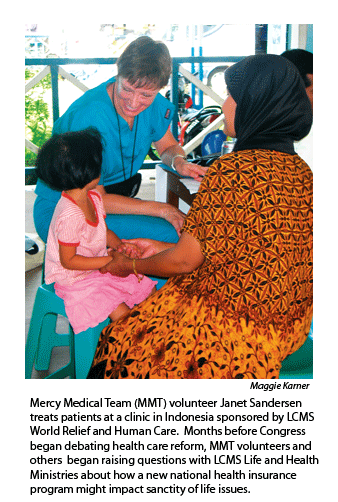By Kim Plummer Krull
Months ago, parish nurses began raising questions with LCMS Life and Health Ministries Director Maggie Karner about how a new national health insurance program might impact sanctity of life issues.
Now that the health care reform debate commands center stage in Congress, Karne r urges all LCMS members to “stay informed and make your voices heard with your own legislators.”
r urges all LCMS members to “stay informed and make your voices heard with your own legislators.”
“This debate has the potential to radically change how issues of sanctity of human life are dealt with in this country,” said Karner, referring to the myriad of health care reform proposals being presented in Congress. “While our legislators are wrestling with the nuts and bolts of the economics and logistics of health care reform, our job as good Christian citizens is to look into the potential impact on issues concerning the beginning and end of life and other ethical concerns.”
To help LCMS members “cut through the rhetoric” of proposed legislation and understand the potential impact on pro-life issues, LCMS World Relief and Human Care — the Synod’s mercy arm, which includes LCMS Life and Health Ministries — is providing regularly updated information and analysis at http://www.lcms.org/healthcare.
“Everything in the Bible and the Lutheran Confessions propels us to reach into our communities and to act as good citizens,” said LCMS WR-HC Executive Director Rev. Matthew Harrison, pointing to Matt. 5:16, which encourages Christians to give evidence of citizenship in God’s kingdom by practicing good citizenship on earth.
Harrison and Karner cite three specific sanctity of life concerns in proposed health care reform legislation, which are spotlighted on the WR-HC Web pages:
- End-of-life issues and the elderly. Critics are concerned about proposed legislation calling for discussions between Medicare patients and a health care practitioner about end-of-life services and support. Because these discussions may not include family members, critics see a potential for misunderstandings and pressure to sign documents such as living wills and durable powers of attorney.
- Protection of the unborn. Where a proposal refers to taxpayer-funded “family planning services,” critics dislike that such services aren’t clearly defined to exclude abortion.
- Protection of health care workers’ “conscience rights.” Critics fear that proposed legislation may force insurance companies, employers, and individual medical professionals to provide, pay for, and/or participate in medical procedures contrary to their personal beliefs.
But even as LCMS WR-HC points out moral concerns in proposed legislation, Karner stresses the importance of “everyone having access to good, affordable heath care.”
“We are not trying to kill or discourage health care reform, but want to be lively partners in this debate,” she said. “We want to encourage our legislators to offer good, solid health care to people who desperately need it, but to do so in a way that is morally acceptable.”
Much of the wording is ambiguous in health care reform proposals, a big reason many pro-life Christians are keeping a close eye on the debate, said Karner, who worked with Ed Szeto, coordinator for Life Ministries special projects, and Dolliene Raabe, MSW, LCSW, managing editor of LCMS WR-HC’s Mercy Notes and Just In From The Hill newsletters, to compile the WR-HC Web resources.
“We tried to separate the political from the moral [issues],” Karner said. “We want to model good Christian citizenship and encourage involvement in the debate, but it’s very hard to be involved if you don’t understand what’s going on.”
Karner welcomes feedback and can be contacted at 800-248-1930, ext. 1380, or maggie.karner@lcms.org.
Kim Plummer Krull is a freelance writer and a member of St. Paul’s Lutheran Church, Des Peres, Mo.
Posted Oct. 6, 2009



